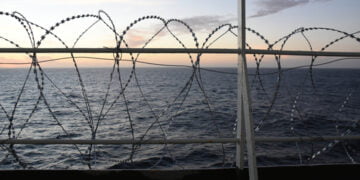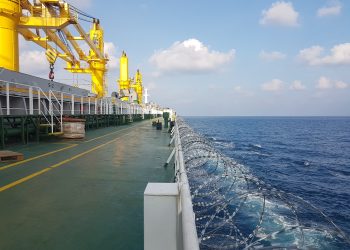The German government now wants to regulate certification for armed guards
 Sea piracy off the coast of Somalia has dropped dramatically, in part as the result of private security forces accompanying the ships. The German government now wants to regulate their certification.
Sea piracy off the coast of Somalia has dropped dramatically, in part as the result of private security forces accompanying the ships. The German government now wants to regulate their certification.
The German Cabinet has agreed on legislation to introduce a licensing procedure for security companies on board ships. The draft bill determines which requirements these firms have to fulfill if they are protecting German-registered vessels. The government coordinator for the maritime industry, Hans-Joachim Otto, welcomed the decision.
“We want reliable, well-trained security teams, not desperados and mercenaries,” Otto said on Wednesday. Beginning in mid-2013, only licensed companies will be allowed to take over security on German ships.
However, there will be no review or training of individual employees, as is the case in companies operating on land, for example security for cash transport. According to Otto, the companies have to prove on the basis of “watertight documents” that all standards were fulfilled.
“We are breaking new ground here,” Otto said. “We mainly have foreign companies that operate in international waters.” The German government estimates that British and US companies in particular could apply for a license.
Companies to exert self-control
The Federal Office of Economics and Export Control (BAFA) will most likely be the office in charge of the procedure. It will be able to call in the Federal Police for consultation. Security firms will have to pay between 8,000 euros ($9,800) and 16,000 euros for the licenses, which will be valid for two years.
Weapons for the private ship protectors will have to be registered separately. The law stipulates that no heavy military weapons can be employed. Semi-automatic weapons, though, could be permitted.
The compliance with the security standards during the deployment is supposed to be controlled though written documentation by the company itself. Controls on the ships were not planned.
“We are not able to send along a supervisor from the regulatory authority on every ship,” Otto said.
Declining piracy off Somalia’s coast
About half of all German merchant ships last year had to take the route along dangerous waters off the coast of Somalia, the German federal economics ministry said. But the threat from pirates in that region has diminished.
Attacks off Somalia’s coast dropped to 69 in the first six months of 2012, down from 163 in that period a year earlier, the International Maritime Bureau said. At the same time, however, it said there were intensified attacks in the Gulf of Guinea off western Africa, where 32 cases including five hijackings were reported, up from 25 in the first half last year.
Otto said one reason for the decrease in Somali piracy was that ship crews were adhering more closely to security rules than was the case in the past. This included for example that ships followed certain set routes, increased their guard posts on the bridge and sailed through risk areas at maximum speed.
The European Union’s Atalanta mission against piracy has also shown some success. A third decisive factor for the decrease in attacks was that a growing numbers of ships were hiring armed security.
“Never in history have pirates successfully captured a ship which had private security guards on board,” Otto said.
Shipowners welcome legislation
In the past a number of German ships were protected by armed security forces. But their deployment has to date not been regulated. With this legislation, the German government implements guidelines proposed by the International Maritime Organization, which had called on individual countries to introduce corresponding laws. The German Shipowners’ Association VDR welcomed the decision.
“Our ship owners need clear conditions in order to effectively protect seamen from the continuing threat of piracy,” said VDR president Michael Behrendt in a statement.

German shipping companies operate the third largest merchant fleet in the world. However, only a small proportion flies under the German flag. The country’s black-red-gold flag only flies on 492 ships. This makes the vessels German territory. Criminal offences on board, for example, are tried before German courts.
On the other hand, 3,161 ships operated by German shipping companies sail under foreign flags. Shipowners, unions and the government are aiming to bring a total of 600 ships under the German flag. But to date, this goal has shown little success.
Source: DW



























































